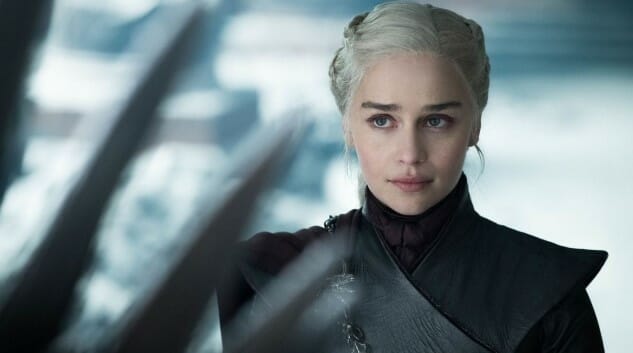Paste’s Power Rankings: The 10 Best Shows on TV Right Now
Michael Yarish/CBS, HBO, Netflix
It was a big (bang theory) week for television as the medium’s biggest drama and biggest comedy aired their final episodes. The TV landscape has changed so much since The Big Bang Theory premiered in 2007 and Game of Thrones premiered in 2011. It’s hard to fathom that we will ever again experience the collective pop-culture letdown that Game of Thrones provided in its final weeks. With the fractured nature of TV now, will there ever again be a show that many people watch all at the same time?
Even with the outrage, Game of Thrones dominated the TV discussion last week. So as we bid adieu to the dragons and the misplaced water bottles and coffee cups, the epic drama goes out at number one.
The rules for the power list are simple: Any series on TV qualifies, whether it’s a comedy, drama, news program, animated series, variety show or sports event. It can be on a network, basic cable, premium channel, Netflix, Amazon, Hulu, YouTube or whatever you can stream on your smart TV, as long as a new episode was made available the previous week—or, in the case of shows released all at once, it has to have been released within the previous six weeks.
The voting panel is composed of Paste editors and TV writers with a pretty broad range of tastes. We’re merciless: a bad episode can knock you right off this list. So much good TV is available right now.
Honorable Mentions: The Spanish Princess, The Good Fight, Barry, Jane the Virgin, Killing Eve and Brooklyn Nine-Nine
10. Star vs. the Forces of Evil
Network: Disney Channel
Last Week’s Ranking: Not ranked

While tens of millions of eyeballs tuned in to HBO this past Sunday to watch one fantasy epic come to a close, millions of others turned to Disney Channel, where Daron Nefcy’s metal-as-heck animated princess vs. monster vs. magic vs. xenophobia fantasy epic, Star vs. the Forces of Evil, took its final bow. Originally a series about wayward teen princess Star Butterfly (Eden Sher) getting shipped off to Earth, where she and her new best friend Marco (Adam McArthur) fought monsters in between crushing on classmates and flailing through other awkward rites of puberty, Star vs. the Forces of Evil ended up being a deeply thoughtful allegory on the corrosive effects of total power (here, magic) and the moral imperative to fight hatred and xenophobia in whatever form it might take. As an animated series geared towards a kid audience, Star vs. the Forces of Evil couldn’t get as brutally, viscerally graphic as Game of Thrones, but what it had to forego in the way of violent sexual assault, bloody battles and ever-mounting body counts, it made up for in subtly complex existential horror—horror made all the more devastating for being candy-colored and full of butterflies and unicorns.
Sunday’s finale, though shorter than most fans would have liked for it to be, delivered an ending to Star and Marco’s journey that was both satisfying and earned. On a character level, it maintained the growth that not only each of the principles, but also all the key secondary players, had fought to attain across the show’s four seasons. More importantly for Disney’s target audience, it also put a bow on every lingering relationship arc, most critically between Star and Marco (#Starco forever), but also between Marco’s ex and her new French girlfriend, between Queen Eclipsa (Esmé Bianco) and the ghost of the monster-slaying mother who imprisoned her, and between Star and her own mother, Queen Moon (Grey Griffin), the latter who had spent the penultimate episode betraying Mewni in a way Daenerys Targaryen would have approved of. Plot-wise, it also tied off every lingering “how do we stop the destructive power of magic without losing ourselves” story the final season had set up, while not pretending, to itself or its audience, that the way Star ends up answering that question will dissolve the xenophobia pulsing just under Mewni’s surface, or will mean that there’s not more work for the characters to do once the animators put their digital pens down. But that’s the mark of a good story, told well: While we can be sad that we’ll miss all the adventures that Star and Marco get up to next, that they will be adventuring—and loving, and governing, and solving the universe’s Big Problems—isn’t even a question. Of course they will be. They’re as real as any metal-as-heck fictional characters ever could be, and we’re lucky they get to live on in our imaginations forever. — Alexis Gunderson
9. The Society
Network: Netflix
Last Week’s Ranking: 7

-

-

-

-

-

-

-

-

-

-

-

-

-

-

-

-

-

-

-

-

-

-

-

-

-

-

-

-

-

-

-

-

-

-

-

-

-

-

-

-
















































